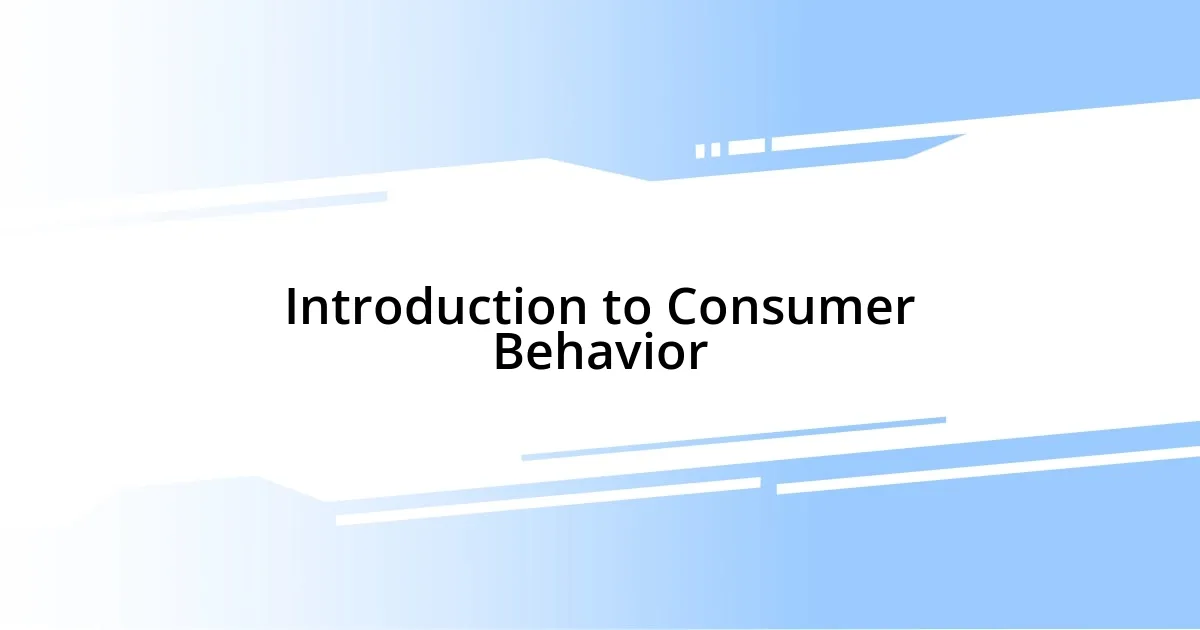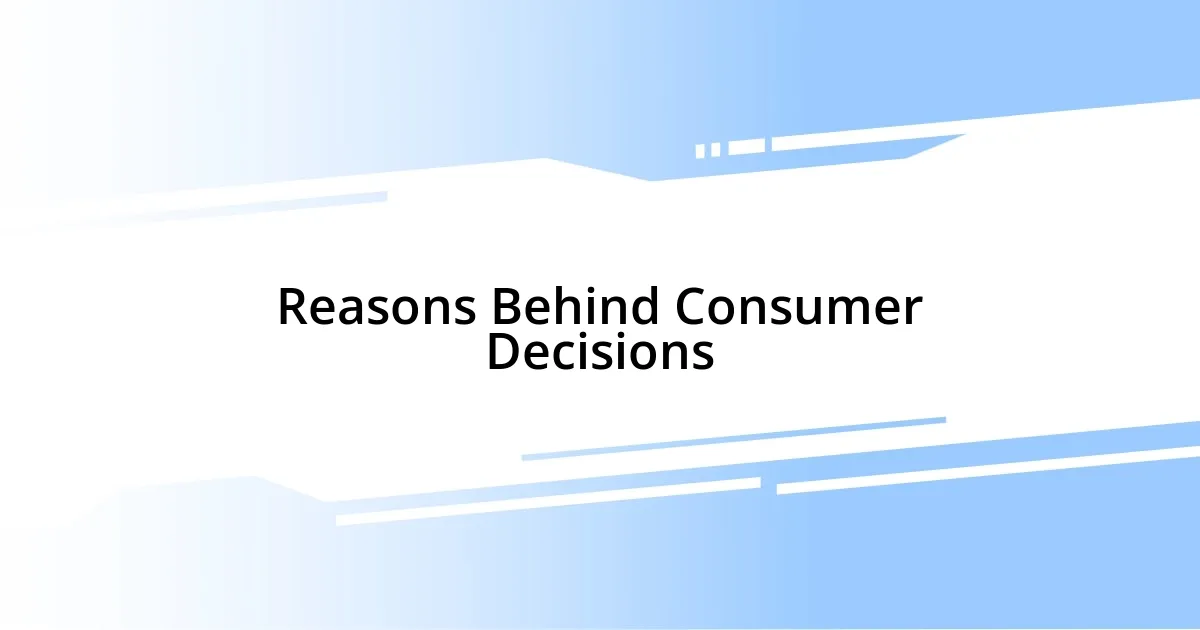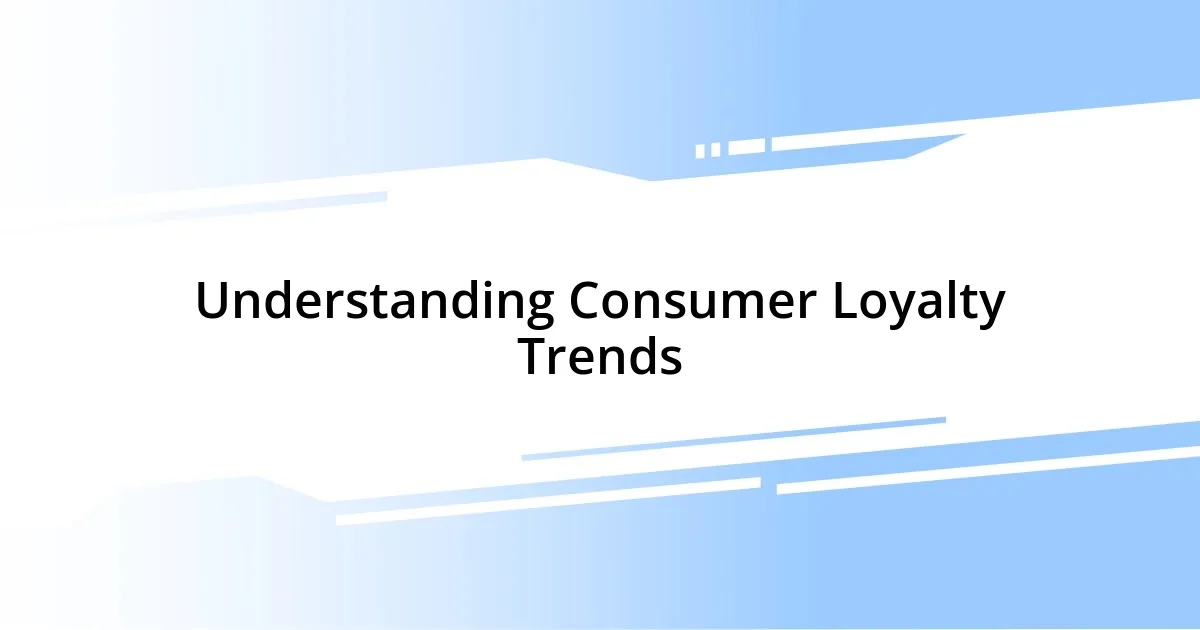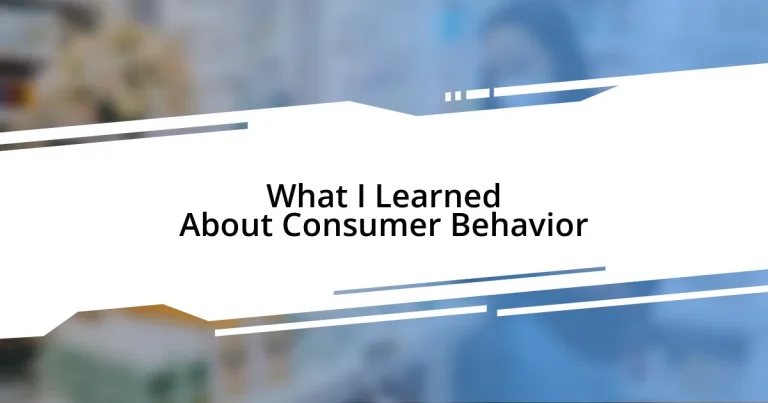Key takeaways:
- Consumer behavior is influenced by emotional connections, social trends, and personal experiences, beyond just functionality.
- Key drivers of consumer decisions include emotional triggers, social influence, and price sensitivity.
- Building brand loyalty relies on transparency, emotional investment, and personalized customer experiences.
- Applying consumer behavior insights can enhance marketing strategies and improve customer engagement significantly.

Introduction to Consumer Behavior
Consumer behavior is a fascinating area that delves into the intricacies of how individuals make decisions about purchasing goods and services. I remember my own experience during a recent shopping spree; I found myself drawn to a brand not just because of its products, but due to its compelling story. Isn’t it interesting how our emotional connections often guide our choices more than mere functionality?
Understanding consumer behavior goes beyond just tracking spending patterns. It’s about deciphering the underlying motivations that drive people to buy, which can sometimes be influenced by social trends or personal experiences. I recall a time when a friend felt compelled to upgrade her smartphone simply because everyone around her was doing the same. Doesn’t this make you wonder how much peer pressure affects our choices?
When we explore consumer behavior, we uncover the combination of psychology, sociology, and economics that shapes everyday purchasing decisions. Have you ever considered how advertisements can evoke feelings that lead to buying something you might not even need at that moment? Personally, I often find myself swayed by vibrant marketing campaigns that tap into my sense of nostalgia or belonging. Each encounter with a brand becomes more than just a transaction; it’s an experience that reflects our identities.

Reasons Behind Consumer Decisions
Understanding the reasons behind consumer decisions is vital for anyone interested in marketing. I’ve noticed that choices often stem from a mix of emotional triggers and rational thinking. For instance, I once chose a specific brand of coffee because it reminded me of cozy mornings spent with my grandmother. The memories tied to that brand were more compelling than the price or quality alone.
Another key factor is social influence. I often find myself influenced by online reviews or recommendations from friends. Recently, I decided to try a new skincare product solely because several of my friends raved about it on social media. Their experiences seemed to validate my choice, making it easier for me to trust the product. It’s fascinating how our decisions can be swayed by what others think or say.
Price sensitivity also plays a crucial role in consumer behavior. There have been times when I hesitated to buy a particular gadget simply because it was outside my budget. Reflecting on that moment, I realized that even when a product is desirable, financial considerations can dominate our choices. It’s a delicate balance between desire and practicality that every consumer navigates daily.
| Reasons for Consumer Decisions | Examples from Personal Experience |
|---|---|
| Emotional Triggers | A brand reminding me of family moments |
| Social Influence | Friends’ recommendations swaying my product choices |
| Price Sensitivity | Hesitation to purchase due to budget constraints |

Understanding Consumer Loyalty Trends
Consumer loyalty trends have evolved significantly in recent years, reflecting deeper emotional ties that consumers develop with brands. I remember being part of a focus group for a new health food brand, where the enthusiasm of participants directly stemmed from brand transparency about sourcing and production. People were willing to pay a premium because they felt a connection rooted in trust and shared values, showcasing how emotional investment plays a pivotal role in loyalty.
- Transparency about sourcing creates trust.
- Emotional connections lead to brand loyalty.
- Social media engagement strengthens consumer relationships.
I’ve also noticed that loyalty extends beyond just product satisfaction; it’s about feeling valued as a customer. When a brand goes above and beyond in its customer service or rewards program, I tend to stick around. Once, a retailer surprised me by addressing my past concerns and offering a tailored discount based on my shopping habits. That personal touch not only impressed me but also solidified my loyalty—an experience that made me a passionate advocate for their products.

Applying Insights to Your Business
Applying insights from consumer behavior can revolutionize the way we market our products. For instance, I once partnered with a local cafe and suggested they highlight their sourcing story on social media. When they did, I noticed not just an increase in engagement, but a palpable excitement from the community, eager to support a brand that aligned with their values. It’s incredible how transparency can turn casual customers into passionate supporters.
In my experience, understanding emotional triggers can also create unforgettable marketing moments. I remember helping a friend with their online store, and we implemented personalized email campaigns that celebrated customers’ milestones, like birthdays or anniversaries. The response was overwhelmingly positive, and we discovered that recognizing these moments deepened the customers’ attachment to the brand. It’s amazing how a small gesture can spark joy and loyalty.
Moreover, integrating feedback into business practices can lead to meaningful improvements. After conducting a simple survey, I realized customers wanted more eco-friendly options. Implementing these changes not only satisfied their demands but also attracted a whole new audience. Have you ever considered how often customer feedback could be your best roadmap? Embracing such insights can really set your business apart in a competitive market.












